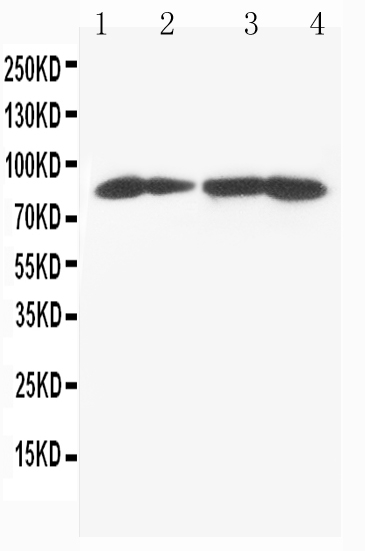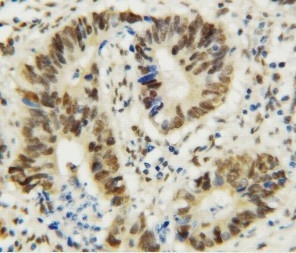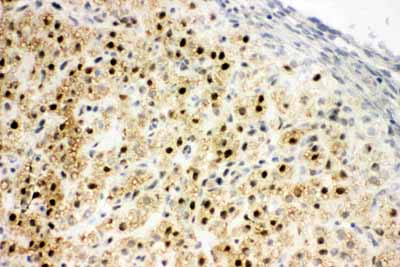Anti-MTA1 Antibody
- SPECIFICATION
- CITATIONS
- PROTOCOLS
- BACKGROUND

Application
| WB, IHC-P, IHC-F |
|---|---|
| Primary Accession | Q13330 |
| Host | Rabbit |
| Reactivity | Human, Mouse, Rat |
| Clonality | Polyclonal |
| Format | Lyophilized |
| Description | Rabbit IgG polyclonal antibody for Metastasis-associated protein MTA1(MTA1) detection. Tested with WB, IHC-P, IHC-F in Human;Mouse;Rat. |
| Reconstitution | Add 0.2ml of distilled water will yield a concentration of 500ug/ml. |
| Gene ID | 9112 |
|---|---|
| Other Names | Metastasis-associated protein MTA1, MTA1 |
| Calculated MW | 80786 MW KDa |
| Application Details | Immunohistochemistry(Frozen Section), 0.5-1 µg/ml, Mouse, Rat, Human Immunohistochemistry(Paraffin-embedded Section), 0.5-1 µg/ml, Human, Mouse, Rat, By Heat Western blot, 0.1-0.5 µg/ml, Human, Rat, Mouse |
| Subcellular Localization | Isoform Short: Cytoplasm. |
| Tissue Specificity | Widely expressed. High expression in brain, liver, kidney, and cardiac muscle, ovaries, adrenal glands and virgin mammary glands. Higher in tumors than in adjacent normal tissue from the same individual. Up-regulated in a wide variety of cancers including breast, liver, ovarian, and colorectal cancer and its expression levels are closely correlated with tumor aggressiveness and metastasis. . |
| Protein Name | Metastasis-associated protein MTA1 |
| Contents | Each vial contains 5mg BSA, 0.9mg NaCl, 0.2mg Na2HPO4, 0.05mg Thimerosal, 0.05mg NaN3. |
| Immunogen | A synthetic peptide corresponding to a sequence at the C-terminus of human MTA1(676-696aa ETKRAARRPYKPIALRQSQAL), identical to the related mouse and rat sequences. |
| Purification | Immunogen affinity purified. |
| Cross Reactivity | No cross reactivity with other proteins |
| Storage | At -20˚C for one year. After r˚Constitution, at 4˚C for one month. It˚Can also be aliquotted and stored frozen at -20˚C for a longer time.Avoid repeated freezing and thawing. |
| Sequence Similarities | Contains 1 BAH domain. |
| Name | MTA1 |
|---|---|
| Function | Transcriptional coregulator which can act as both a transcriptional corepressor and coactivator (PubMed:16617102, PubMed:17671180, PubMed:17922032, PubMed:21965678, PubMed:24413532). Acts as a component of the histone deacetylase NuRD complex which participates in the remodeling of chromatin (PubMed:16428440, PubMed:28977666). In the NuRD complex, regulates transcription of its targets by modifying the acetylation status of the target chromatin and cofactor accessibility to the target DNA (PubMed:17671180). In conjunction with other components of NuRD, acts as a transcriptional corepressor of BRCA1, ESR1, TFF1 and CDKN1A (PubMed:17922032, PubMed:24413532). Acts as a transcriptional coactivator of BCAS3, and SUMO2, independent of the NuRD complex (PubMed:16617102, PubMed:17671180, PubMed:21965678). Stimulates the expression of WNT1 by inhibiting the expression of its transcriptional corepressor SIX3 (By similarity). Regulates p53-dependent and -independent DNA repair processes following genotoxic stress (PubMed:19837670). Regulates the stability and function of p53/TP53 by inhibiting its ubiquitination by COP1 and MDM2 thereby regulating the p53-dependent DNA repair (PubMed:19837670). Plays a role in the regulation of the circadian clock and is essential for the generation and maintenance of circadian rhythms under constant light and for normal entrainment of behavior to light-dark (LD) cycles (By similarity). Positively regulates the CLOCK- BMAL1 heterodimer mediated transcriptional activation of its own transcription and the transcription of CRY1 (By similarity). Regulates deacetylation of BMAL1 by regulating SIRT1 expression, resulting in derepressing CRY1-mediated transcription repression (By similarity). With TFCP2L1, promotes establishment and maintenance of pluripotency in embryonic stem cells (ESCs) and inhibits endoderm differentiation (By similarity). |
| Cellular Location | Nucleus [Isoform Long]: Nucleus. Nucleus envelope. Cytoplasm. Cytoplasm, cytoskeleton. Note=Associated with microtubules (PubMed:24970816). Localization at the nuclear envelope is TPR- dependent (PubMed:24970816). |
| Tissue Location | Widely expressed. High expression in brain, liver, kidney, and cardiac muscle, ovaries, adrenal glands and virgin mammary glands. Higher in tumors than in adjacent normal tissue from the same individual. Up-regulated in a wide variety of cancers including breast, liver, ovarian, and colorectal cancer and its expression levels are closely correlated with tumor aggressiveness and metastasis |

Thousands of laboratories across the world have published research that depended on the performance of antibodies from Abcepta to advance their research. Check out links to articles that cite our products in major peer-reviewed journals, organized by research category.
info@abcepta.com, and receive a free "I Love Antibodies" mug.
Provided below are standard protocols that you may find useful for product applications.
Background
Metastasis-associated protein MTA1 is a protein that in humans is encoded by the MTA1 gene. This gene encodes a protein that was identified in a screen for genes expressed in metastatic cells, specifically, mammary adenocarcinoma cell lines. Expression of this gene has been correlated with the metastatic potential of at least two types of carcinomas although it is also expressed in many normal tissues.By fluorescence in situ hybridization, mapped the MTA1gene to chromosome 14q32.3. MTA1 is a component of the chromatin remodeling complex that influences gene transcription by modulating target gene chromatin. MTA1 is widely upregulated in many carcinomas.
If you have used an Abcepta product and would like to share how it has performed, please click on the "Submit Review" button and provide the requested information. Our staff will examine and post your review and contact you if needed.
If you have any additional inquiries please email technical services at tech@abcepta.com.













 Foundational characteristics of cancer include proliferation, angiogenesis, migration, evasion of apoptosis, and cellular immortality. Find key markers for these cellular processes and antibodies to detect them.
Foundational characteristics of cancer include proliferation, angiogenesis, migration, evasion of apoptosis, and cellular immortality. Find key markers for these cellular processes and antibodies to detect them. The SUMOplot™ Analysis Program predicts and scores sumoylation sites in your protein. SUMOylation is a post-translational modification involved in various cellular processes, such as nuclear-cytosolic transport, transcriptional regulation, apoptosis, protein stability, response to stress, and progression through the cell cycle.
The SUMOplot™ Analysis Program predicts and scores sumoylation sites in your protein. SUMOylation is a post-translational modification involved in various cellular processes, such as nuclear-cytosolic transport, transcriptional regulation, apoptosis, protein stability, response to stress, and progression through the cell cycle. The Autophagy Receptor Motif Plotter predicts and scores autophagy receptor binding sites in your protein. Identifying proteins connected to this pathway is critical to understanding the role of autophagy in physiological as well as pathological processes such as development, differentiation, neurodegenerative diseases, stress, infection, and cancer.
The Autophagy Receptor Motif Plotter predicts and scores autophagy receptor binding sites in your protein. Identifying proteins connected to this pathway is critical to understanding the role of autophagy in physiological as well as pathological processes such as development, differentiation, neurodegenerative diseases, stress, infection, and cancer.




